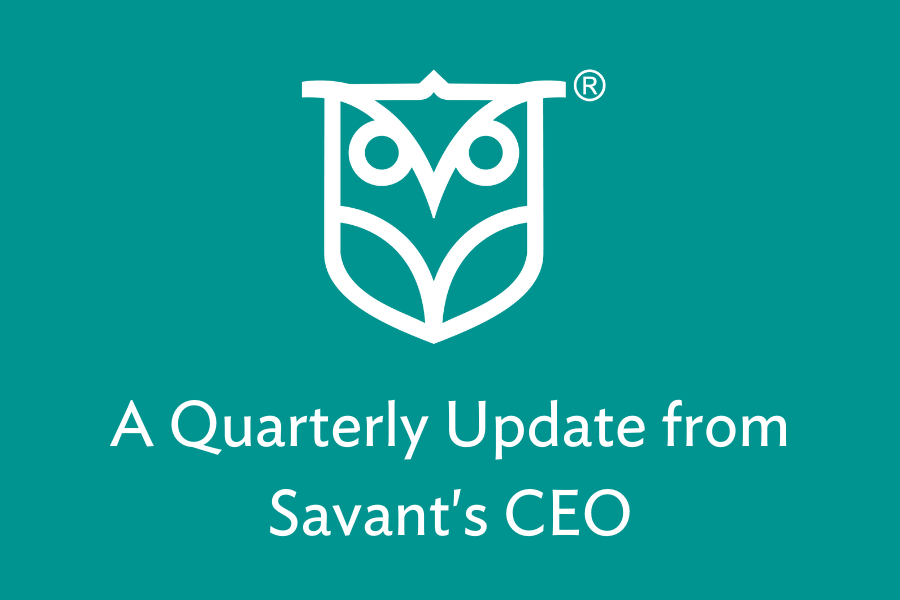Don’t Short-Change the Long View

With a difficult first half of the year now in the books, it is important to take a step back and reflect on where we are and where we may be headed. It has been an unusual time for the markets as both stocks and bonds have experienced meaningful declines which presents a unique challenge for us as investors. As we acknowledge this reality, we must also be careful not to overreact and abandon the time-tested principles that have seen us through challenging periods in the past.
The coming recession?
Economists and market pundits have had a very public debate about the likelihood of a recession in the second half of 2022. On one hand, the labor market has remained strong which is generally a sign of economic resiliency. On the other hand, consumer spending has begun to show the first signs of weakness. The Federal Reserve’s actions will continue to play a key role in the coming months in charting our economic course. While they are certainly aiming for a soft landing (slow to flat economic growth, avoiding a recession), that is much easier said than done. With so much uncertainty, it is only natural to wonder: is there something I should be doing as an investor to prepare?
Markets are forward-looking
It can be tempting to make a change and try to sidestep what appears to be a looming recession. However, these are the times when discipline and staying the course have been rewarded historically. We know that market timing is incredibly difficult, but market timing based on economic data is even more dangerous. Economic data is a measurement of the past, while markets are forward-looking. This means that the probability of a recession has already been mostly priced in. We have seen numerous examples of the stock market rebounding when the headlines are at their worst; therefore, it is critical to not let our investment decisions be guided by public sentiment.
As we turn our attention to the second half of 2022, Savant remains focused on the things that matter most to our clients. We continue to invest in the people and technology that allow us to channel our collective wisdom and experience into delivering the best possible services across financial planning, investments, tax planning, wealth transfer, and more. We are confident that together we can navigate whatever the future holds, and we look forward to serving as your wise counsel on that journey.
These are our observations about the economy and asset classes for the 2nd quarter:
Economy
Consumer spending remained fairly strong throughout the second quarter which helped bolster the economy. The most recent forecast from The Conference Board projects real U.S. GDP growth to come in at an annualized rate of 1.9%, following a negative 1.6% print in Q1. The unemployment rate continued to fall, dropping to 3.6% in the most recent report.
Stocks
Global stocks (MSCI All Country World IMI Index) fell 15.8% as risk assets faced intense pressure. U.S. large cap stocks (S&P 500 Index) struggled, losing 16.1%, while U.S. small stocks (Russell 2000 Index) and international large stocks (MSCI EAFE Index) dropped by 17.2% and 14.5%, respectively. The best performing equity asset class for the second quarter was emerging market stocks (MSCI Emerging Markets Index) which were only down 11.5%. On the other end of the spectrum, U.S. Large Momentum stocks (MSCI USA Momentum Index) lost 18.7% during the quarter.
Bonds
Fixed income returns were also negative for the quarter, as U.S. intermediate-term bonds (Bloomberg U.S. Aggregate Bond Index) were down 4.7%, while their international counterparts (JPM GBI Global Ex U.S. Index) lost 4.6%. TIPS (Bloomberg Global Inflation Linked U.S. TIPS Index) also struggled and fell 6.7% in the quarter.
Alternatives
Trend following (Credit Suisse Managed Futures Liquid Index) continued its strong performance, gaining 5.8%. On the negative side, reinsurance (SwissRe Global Cat Bond Index) was down 0.8%, while direct lending (Cliffwater Direct Lending Index) lost 3.1%, event driven (IQ Hedge Event-Driven Index) slid 7.9%, and real assets (DJ Brookfield Gbl Infrastructure Index) dropped 7.2% for the quarter.
Thank you for your continued trust in Savant.
Sincerely,
Brent R. Brodeski, MBA, CPA, CFP®, CFA®
Chief Executive Officer
Sources: Morningstar Direct, Federal Reserve, Department of Labor.
Certified Financial Planner Board of Standards Inc. (CFP Board) owns the certification marks CFP® and CERTIFIED FINANCIAL PLANNER™ in the U.S., which it authorizes use of by individuals who successfully complete CFP Board’s initial and ongoing certification requirements.
The achievement of any professional designation, certification, degree, or license, or any amount of prior experience or success, should not be construed by a client or prospective client as a guarantee that he/she will experience a certain level of results if Savant is engaged, or continues to be engaged, to provide investment advisory services.

